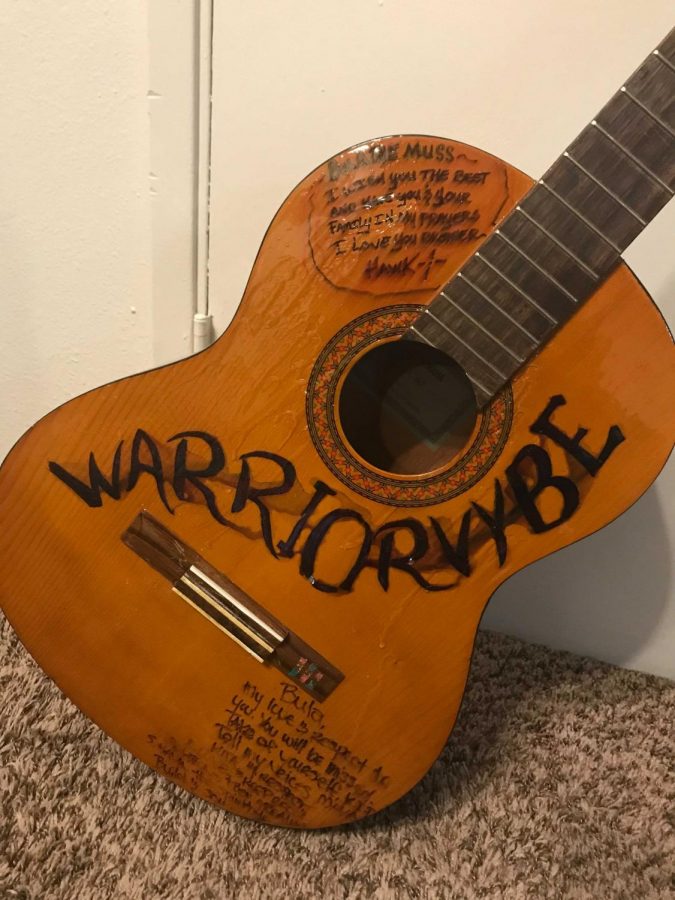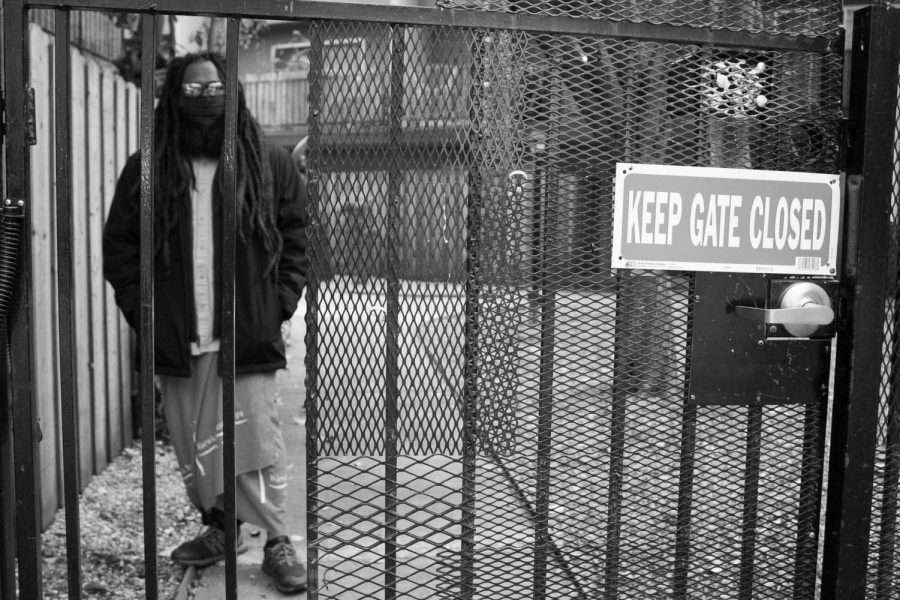Your donation will support the student journalists of Sacramento State University. Your contribution will allow us to purchase equipment and cover our annual website hosting costs.
Joseph stands on the opposite side of a gate to the pool area that has been closed since the start of the COVID-19 pandemic on Wednesday, March 10, 2021 in Sacramento, California. Although he is experiencing the most freedom he has had in years, Joseph is still confined to Sacramento County through the ankle monitor on his right foot that only allows him to travel 50 miles from his home.
Joseph’s experience with incarceration and ICE detention
March 17, 2021
While incarcerated at High Desert California State Prison, Joseph said he began a healing process through familiar outlets of music and faith. Joseph recalled being welcomed into Native American Sweat Lodge ceremonies that allowed him to process his actions and the anger and frustration left in his father’s absence.
“That really assisted my spiritual growth,” Joseph said, adding that about seven years into his sentence was a true turning point. “After being locked up for so long, I finally started to think clearly, everything just clicked and I had clarity.”
In 2013, Joseph said he was transferred to California State Prison, Solano, for some time where he resumed his education, obtained his GED certificate and went on to take college classes. Eventually, Joseph began teaching music and art classes as well as cultural dances, such as the Haka, which he said helped him “build community” within the prison.
Joseph recalled the first time he saw a guitar on prison grounds. He said it belonged to a fellow inmate who had ordered it through a prison catalog and sold it to him for $100.
“I played it so much I broke all the strings,” Joseph said. “I was so happy to get that connection back to music, that was a big thing for me.”
Joseph said from that moment forward, music was a constant in his rehabilitation. He became the coordinator for music at the prison. He put on concerts in the prison yard and played music in the visiting rooms “to switch up the atmosphere so people weren’t so tense.”

A few years later, Joseph said he was transferred back to High Desert, where he remained until he was granted parole and released May 17, 2019, a day after his birthday. The day before, Joseph said fellow inmates signed his classical acoustic guitar with well-wishes for his release, a release Joseph would find short-lived as he was immediately detained and transferred directly to the for-profit private Mesa Verde ICE Processing Facility in Bakersfield, California.
According to an American Civil Liberties Union research report, the immigration detention system grew exponentially under the Trump administration, exacerbating the prison-to-detention-to-deportation pipeline that disproportionately disadvantages Black and Latinx migrants by expediting them back to their country of origin, oftentimes without proper adjudication.
“That was an unjust transfer,” said Rhonda Rios Kravitz, founding member of the Sacramento Immigration Coalition and CEO of Alianza, adding that Joseph had already served his time and was proved to be rehabilitated.
The Sacramento Immigration Coalition is a grassroots collective of various organizations, including Alianza, that work to further immigrant rights in the Sacramento area by advocating, sharing resources and creating presence in the community, according to its Facebook page.
“Charles engaged while he was in prison in a self-inquiry that led to significant change in his life,” Rios Kravitz said. “Despite hardship and despite suffering, he is there with a positive attitude and willingness to help others.”
Rios Kravitz, a Sac State alumna and former library faculty of 17 years, said the Sacramento Immigration Coalition was approached by Interfaith Movement for Human Integrity shortly after Joseph was detained.
Interfaith Movement for Human Integrity is an Oakland-based statewide organization that is “at the intersection of spirituality and social movements” and unites faith communities to take stands on issues of immigration and incarceration.
“Our role has been to partner with a family or individuals that are impacted by these systems, and accompany them, and in this case, push for a pardon campaign,” said Galatea King, the Northern California regional organizer for Interfaith Movement. King said that Interfaith Movement was first contacted by Joseph’s wife, Shelly Clements, in an effort to raise more awareness of Joseph’s detainment to bring him home to his family.
Rios Kravitz said the partnership of the two coalitions culminated in a petition for pardon from Gov. Newsom, adding that Mayor Darrell Steinberg has written a letter of support on Joseph’s behalf. A letter of support from October is co-signed by 40 organizations including Norcal Resist, the Poor People’s Campaign, Project Rebound, and the Center on Race, Immigration and Social Justice.
Gov. Newsom has not pardoned Joseph as of yet.

